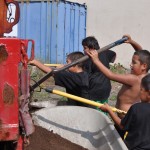
In our fair cities of Minneapolis and St. Paul, the gap between the haves and have-nots is so striking that it can literally be tasted. The difference in food selection and availability between low-income neighborhoods and wealthy neighborhoods is painfully obvious. In this world, far to few folks acknowledge that access to healthy foods is a basic human right.
Now's the time for us to stand up together and work for a better future, where healthy food is available and accessible to everyone.
Food Justice
When we give our bodies good food, we feel good. When we feel good inside it shows on the outside. Folks who feel healthy have less stress and more freedom.
Without good food, our bodies suffer. Near term problems like belly aches and low energy become long term health threats such as diabetes and heart disease after years of eating nutritionally valueless food on a regular basis.
When whole neighborhoods are starved of decent, healthy food, the entire community is damaged in an ongoing and self-perpetuating way. Parents who themselves were raised on convenience store food in-turn feed their kids the same processed foods. Communities routinely loose wealth due to health care costs that are crushing to the personal finances of their under-nourished unhealthy residents. These communities can get caught in a downward spiral of community destruction, after all if you can’t afford your health care bills, how could you possibly afford healthy food, and without healthy food, how could you possibly avoid health care costs?
Walking through the convenience store isles in any low-income neighborhood in the city will quickly prove the point. Rarely are fresh vegetables to be found in these types of stores, and the bulk of the products on the shelf contain artificial colors, flavors, and preservatives. When taken into account the fact that for many low-income families the neighborhood convenience store is the only accessible or affordable food source, a vast injustice becomes obvious. The low-income folks in Minneapolis and St. Paul have a severe lack of access to something that should be the right of all folks everywhere, the human right to healthy food.
Ryan Broden (a.k.a.) Brody, is the Academic Enrichment Coordinator at Little Earth of United Tribes, an American Indian community in South Minneapolis. Brody works with the youth who live at Little Earth, tutoring, organizing activities, and developing positive relationships with the kids who stop by the Ed Center to hang out.
Brody invited Giving Tree to come in and get directly involved with his program and the youth clients he serves. Together we began planning and planting gardens with the kids.
Sometimes we have to remind grown ups that gardening is supposed to be fun, but these kids needed no coaching to find the fun in getting their hands dirty. We planted 3 gardens together throughout the growing season. First we planted a traditional native food garden consisting of what are known as the three sisters: corn, beans, and squash. Next we added compost and butterfly attracting native prairie plants to the grassy garden growing in front of the Little Earth Ed Center.
Soon after these projects were completed we organized a composting project with donations of food waste and wood chips from local businesses. After a day of making compost bins with the kids, it started to rain and we went inside to cook up a healthy stew.
The staff at Little Earth has worked diligently over the past few months not only on the potential for growing good food, but a strong contingent of impassioned employees have organized to grow awareness of the impact of diet on health within Little Earth.
The work of this team of healthy eating activists has begun to drive up the demand for healthy food choices within the community.
With all of this energy infused into the process, the final garden project of the season took on a new life as our largest group of kids yet came out to turn compost into the earth, and plant seeds in the ground this fall for next spring's harvest.




